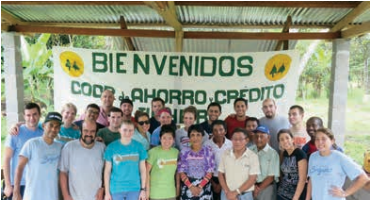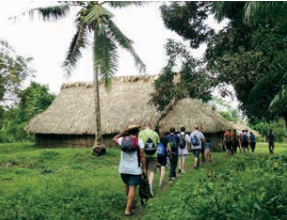This summer, 16 Oakland University students and faculty members joined together to help workers in a rural Panama community gain the business skills necessary to grow their coffee business, all the while learning firsthand about economic development.
Economics major Daniel Ellis and Master of Accounting student Rebecca Braga, ACC ’13, co-led the university’s first
Global Business Brigade. They focused on creating business education workshops and doling out advice on how to improve buying power despite living in an under-resourced community with deep cultural roots.
The Global Business Brigades is the fourth Global Brigades program at Oakland University. OU students have also participated in Global Brigade initiatives in the medical, public health and architecture arenas.
“This experience is a life-changing opportunity for students of all majors,” says Laura Collier, an OU graduate and representative for Global Brigades. “Not only are students able to apply their classroom knowledge to real world challenges, but they're also making a difference directly in these communities.”
Lessons of a lifetime
“It was absolutely one of the best experiences of my life,” says Braga. “I learned so much in seven days.”
As the business brigade leaders, Braga and Ellis recruited OU students to help the workers in Guacuco Guna, a village three hours outside of Panama City. While the rural town ̶ complete with thatched-roof huts ̶ recently received legal status for its credit and savings cooperative, the students taught them accounting, marketing and leadership.
Much of the preparation took place before the group even set foot in Panama. The team held monthly meetings to learn more about Panama and prepare for their brigade jobs, even hosting a car wash fundraiser to buy teaching materials. “We packed 50 pencil boxes filled with an accounting ledger and a notebook, tools they could use while we were teaching them and it sent a signal that we were there to help,” Ellis explains.
The Global Brigade program provided the most valuable tool -- translators. One translated English to Spanish and while a villager translated the Spanish to the worker’s native tongue, Kuna.
Changing lives, gaining skills
Oakland University business students changed lives while also gaining the global knowledge and experience coveted by employers in today’s international marketplace.
Braga improved how to think on her feet and adjust her message based on feedback, often based on her ability to read body language since she had to communicate through translators.
“I grew immensely as a leader,” she says. “I learned to delegate. I learned how to persuade. I learned how to get the best out of a group of different people.” She also gained skills in event planning, recruiting and more.
So did Ellis, who has a long history of jumping in to help. He is a senior airman in Michigan’s Air National Guard, a Salvation Army tutor and a Habitat for Humanity volunteer. He excelled at earning the trust of the community. His management skills impressed the elders, who presented him with a straw hat at the end of the week signifying his distinguished place in the community.
The elders and women of the village also honored Braga with a religious symbol showing their appreciation and respect for her leadership role in the brigade.
A solid foundation
The duo began cultivating these skills through their Oakland University business education, particularly the experiential learning opportunities they have enjoyed. Both are SBA Scholars, a three-part program that teaches leadership and analytical skills to undergraduates and pairs them with a mentor. Both have also completed multiple internships.
The Panama trip was Ellis’ second brigade. He traveled to Honduras last year with the OU Architecture Brigade, where he moved dirt and bricks.
“The Panama trip was more impactful for me because it challenged my mind,” Ellis says. “I got to see community members using what we taught them. When we got there, they had 98 members in their co-op. When we left, they had 102 members because of our marketing lessons.”
The villagers weren’t the only winners, adds Dr. Mark Simon, professor of management and entrepreneurship, and the adviser on the Business Brigade. “The growth I saw in the students was incredible. The job they did in a week in a totally different culture where they didn’t even speak the language -- they were able to make both a short-term and a major long-term impact on that village. It was amazing.”
Ellis agrees, “The real world is often the best classroom there is. I’m all about experiential learning.”
By Rene Wisely


